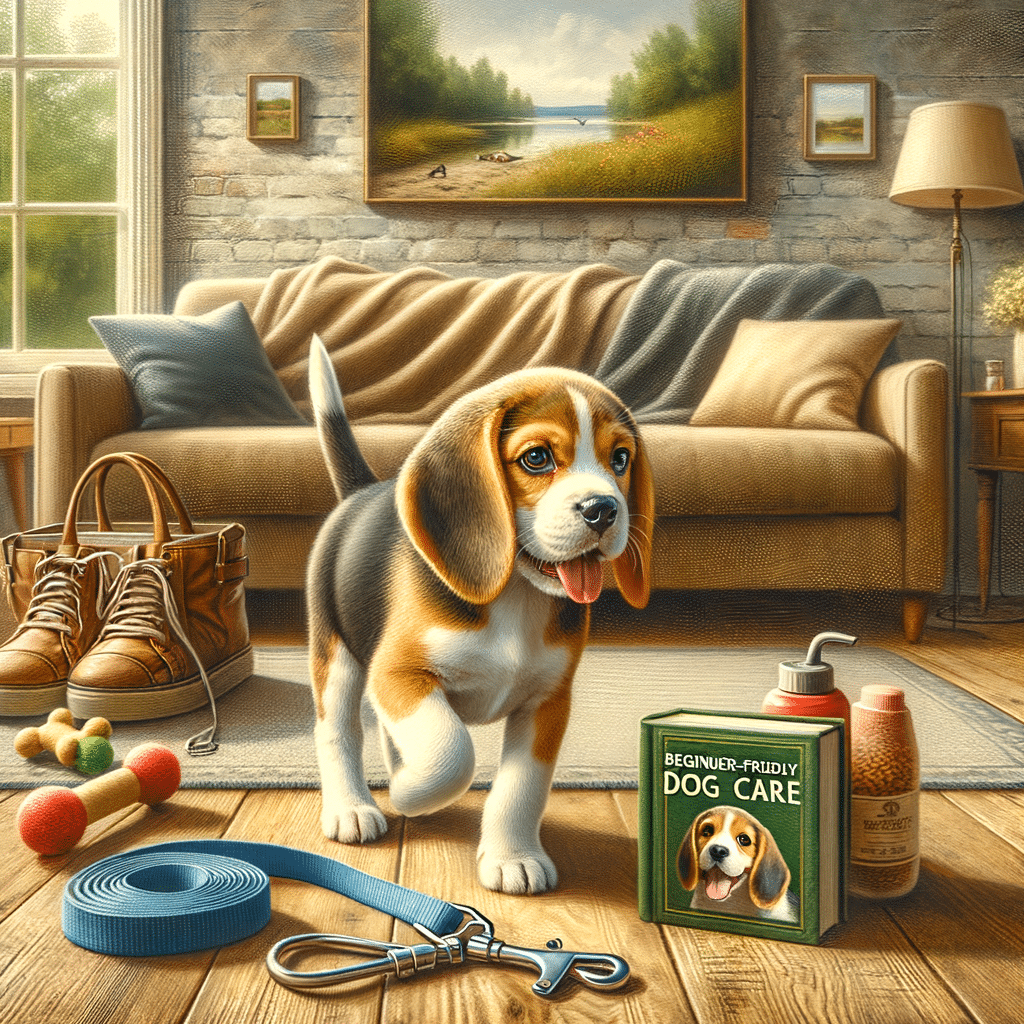Beagles are a popular breed known for their small size, friendly demeanor, and unique appearance characterized by their pleading expression and soft, floppy ears. Initially bred for hunting in packs, they are highly social. They integrate well into family life, thriving on companionship with humans and other pets.
In This Article
Their gentle nature, paired with a love for play, makes them suitable for various household settings. Yet, potential beagle owners should consider their need for regular exercise and mental stimulation to prevent boredom and encourage good behavior indoors.
While beagles generally do well in a home environment, they come with requirements and characteristics that any potential dog owner should understand. They are energetic and curious, requiring daily exercise and secure spaces to explore.
As scent hounds, they can be prone to following their noses, which sometimes leads to distraction or escape attempts. Therefore, consistent training and a watchful eye are essential. Additionally, beagles have a sturdy build and a hardy constitution, but, like all breeds, they have predispositions to specific health issues that should be acknowledged and addressed with regular veterinary care.
Highlights
- Beagles are friendly and family-friendly but require regular exercise and engagement.
- Their hunting heritage gives them a strong instinct to follow scents, necessitating secure living spaces and attentive training.
- Proper care and awareness of health predispositions are essential for maintaining a beagle’s well-being.
Understanding the Beagle Breed
The beagle is a purebred dog recognized by the American Kennel Club (AKC). As a popular breed in the hound group, specifically classified as a scent hound, beagles have historically been used as hunting dogs due to their keen sense of smell and tracking instinct.
Beagles are known for their friendly and sociable nature, making them well-suited for family life. These small dogs exhibit a kind and gentle temperament, contributing to their reputation as great house and apartment dogs. They often show a loyal bond with their owners and are typically eager to please.
In terms of energy, beagles possess a substantial amount. They require regular daily exercise to maintain their dog’s health and happiness. Their intelligence and adaptability can sometimes be overshadowed by their independent nature and occasionally challenging training.
Their stature and adaptable size contribute to the breed’s compatibility with house and apartment living. Yet, prospective pet owners should know that the beagle breed can be vocal, often using their storied howl to express themselves. Understanding these dog traits is essential for anyone considering adding a beagle puppy to their home.
Beagle Temperament and Social Characteristics
Beagles are recognized for their friendly and sociable nature, often making them excellent family dogs. They require regular exercise to match their energy levels. Still, they are adaptable to various living conditions when their needs are met.
Interaction with Family and Children
Beagles typically exhibit a loyal and affectionate temperament, which aligns with being part of a family environment. They are known to be gentle and playful with children, often forming solid bonds with younger family members. However, interactions with young children need to be supervised to ensure the play remains calm and gentle.
Behavior with Other Pets
Originating from packs, beagles tend to be social with other pets, especially dogs. Their friendly nature makes them less prone to aggression, though socialization from an early age is crucial for harmonious living. Some beagles may chase smaller pets due to their hunting instincts, so proper introductions and training are important.
Adaptation to Living Spaces
Despite being energetic, beagles can adapt to apartment living with adequate daily exercise and mental stimulation. They thrive best with access to a backyard to explore and play. Regular walks and outdoor exercise are essential in the absence of a yard to keep them content and prevent separation anxiety. Due to their adaptability and size, beagles can make suitable house dogs if their physical and psychological needs are consistently met.
Health and Care Considerations
When considering a beagle puppy as an apartment dog, prospective owners should know about this breed’s specific grooming, exercise, and health problems. Beagles are known for their energy and intelligence. Still, they also have specific needs that contribute to their overall well-being.
Grooming and Shedding
Beagles have a short, dense coat that occasionally sheds throughout the year. Regular grooming with a medium-bristle brush, a rubber grooming mitt, or a glove brush will help to remove loose hair and maintain the coat’s condition. It’s also essential to keep their ears clean and dry to prevent infections, given their propensity for ear-related issues.
- Frequency of grooming: Weekly brushing; more during seasonal shedding spikes.
- Ear care: Regular checks and cleaning to prevent infections.
Exercise and Training Needs
A beagle’s high energy level necessitates daily exercise to prevent destructive behavior. They benefit greatly from physical activities like walking and playing and mental stimulation, which interactive toys can aid. Beagles respond well to training but should be consistent and patient due to their sometimes stubborn or mischievous nature. Crate training and potty training are vital from an early age.
- Daily exercise: At least one hour.
- Training: Consistent, positive reinforcement techniques.
Health Concerns and Life Expectancy
Beagles are generally healthy but prone to specific health problems such as hypothyroidism, allergies, and patella luxation. It’s crucial to maintain a proper feeding schedule to prevent obesity, which can exacerbate health issues.
Regular vet check-ups can identify and address these conditions early. Ticks can also pose a threat, so preventive measures should be taken. The average life expectancy of a beagle ranges from 10 to 15 years, with proper care extending their lifespan.
- Common beagle health problems: Hypothyroidism, allergies, patella luxation.
- Preventive measures: Regular vet visits, tick prevention, proper diet.
- Life expectancy: Typically 10-15 years.
Living with a Beagle: Insights for Potential Owners
Beagles are known for their friendly temperament and high energy levels, making them lively companions in a household. They thrive on daily exercise and enjoy playing in the backyard and walking. With a small size, beagles can fit well in various living situations, from houses to apartments.
These dogs are popular family pets, owing to their affectionate nature towards children. They are social creatures that generally get along with other pets, but early socialization is crucial to help them adapt. Owners should be attentive to the beagle’s strong instinct to follow scents, a trait from their scent hound heritage endorsed by the American Kennel Club.
Despite their low-maintenance fur, beagles do shed. Regular brushing helps manage this, making them more suitable for house living. They are intelligent; however, their independence can sometimes challenge training. Adequate mental stimulation is necessary to keep them engaged and well-behaved.
Exercise & Activity
- Outdoor exercise: Essential for controlling their energy.
- Backyard play: Offers space for independent exploration.
Health Considerations
- Common health issues include patella luxation, hypothyroidism, and allergies.
- Regular feeding and health checks are essential to manage these concerns.
Housing & Living
- Apartment living: Feasible with regular exercise.
- Small size: Advantageous for homes with limited space.
Living with beagles requires understanding their vocal nature, part of their charm, and their need for companionship. Embracing these characteristics and the required responsibility can create a harmonious life with this adaptable and popular breed.
Frequently Asked Questions
This section addresses some of the most common inquiries of prospective and current beagle owners about the breed.
What are the typical characteristics of beagles as family pets?
Beagles are known for their friendly and pleasant nature. They generally have an even temperament characterized by a strong desire for companionship, making them excellent family pets.
How do beagles typically behave around other dogs?
Beagles usually get along well with other dogs. Their history as pack hounds predisposes them to socializing and interacting positively with their canine peers.
Can beagles be easily trained, and what should potential owners expect?
Beagles can be trained but require consistent and patient training due to their independent and sometimes stubborn nature. Potential owners should expect to invest time in obedience training and socialization.
What are some common challenges associated with raising a beagle?
One common challenge is their strong scent drive, which can lead to distractibility. Beagles can also be vocal and require careful training to manage their baying or howling.
How much maintenance and care do beagles require?
Beagles have a short coat that requires regular brushing to minimize shedding. They also require regular exercise to prevent obesity and routine check-ups to monitor for common health issues.
What are the considerations for first-time dog owners thinking about getting a beagle?
First-time dog owners should consider the beagle’s need for companionship, exercise, and patient training. Understanding the breed’s characteristics and care requirements is crucial for a positive experience.






